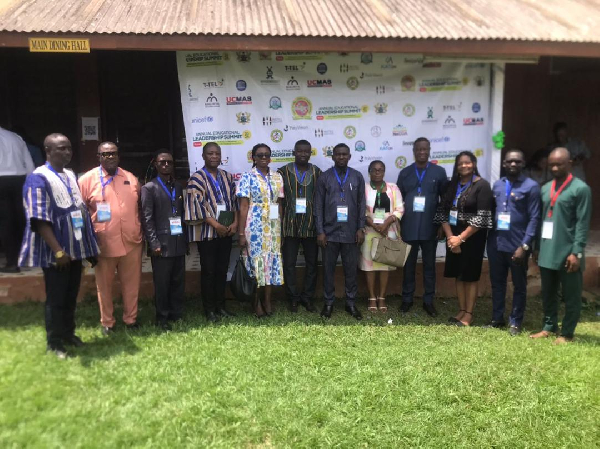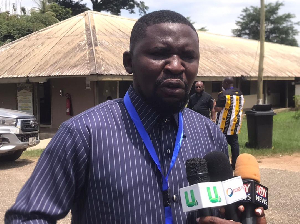The Ghana National Council of Private Schools (GNACOPS) has made a clarion call to the President of Ghana, Nana Addo Dankwa Akufo-Addo, and successive governments to grant the private schools' council a Presidential Charter.
This request, according to them, is in line with Article 25(2) of the 1992 Constitution of the Republic of Ghana, which guarantees the right to establish and maintain private education and participation in the education sector.
Pursuant to this constitutional provision, GNACOPS seeks to establish a formal and statutory framework for private education institutions, ensuring effective coordination and administration with the government.
This framework will facilitate collaboration on national education strategies and policies while protecting the unique needs and contributions of private schools from exclusionary tactics.
According to the Council, the granting of a Presidential Charter will help them become a private education service body, fully representing private education in Ghana.
This vision is long overdue, given the sector's significant contributions to education in Ghana, with 22,000 private schools, three million learners, and 548,632 teaching and non-teaching staff.
Speaking at the launch of the 2nd edition of the GNACOPS 2024 Annual Educational Leadership Summit, the Executive Director of the Council, Obenfo Nana Kwasi Gyetuah, emphasized the need for an inclusive policy environment, valuing diversity in education and providing equal opportunities for all institutions to thrive.
Obenfo Gyetuah stated that the charter would establish a formal and statutory framework that ensures effective coordination and administration between private education institutions and the government.
He added that it would serve as a vital link by empowering private education to collaborate more effectively on national education strategies and policies while also ensuring that the unique needs and contributions of private schools are adequately represented and addressed.
Speaking on the theme "Reimagine, Rethink, and Redeliver: Crafting Education for Perpetual Revolution," he indicated that as players in private education, "We must advocate for an inclusive policy environment that values diversity in education and provides equal opportunities for all institutions to thrive."
He mentioned that granting a Presidential Charter would be a significant step forward in securing the place of private education within the national education framework, ensuring that "we can continue to contribute to the growth and development of Ghana's educational landscape with the recognition and support that we rightfully deserve."
Obenfo Gyetuah also mentioned that the 2024 summit will highlight how to address inclusivity, adding that, in recent times, we have witnessed a disturbing trend of the government sidelining private education through policies that seem designed to weaken or even collapse our participation in the national education framework.
These policies, he mentioned, are not just unfair but detrimental to the millions of students who rely on private institutions for their education, and "we must reimagine what inclusivity means in this context. It is not just about ensuring that every child has access to education, but also about ensuring that private education institutions are recognized and supported as essential partners in national development."
The exclusionary tactics being employed must be replaced with policies that promote equity, recognize the contributions of private education, and integrate our schools fully into the national agenda.
"So, if the government is coming out with a big policy like the Free SHS policy, the 30% placement policy, and the like for public schools, there is the need for the government to appreciate the effort of private education and reach out to them," he stated.
The council is again calling on educational stakeholders to introduce and integrate digital literacy in the educational space because we have seen that the kind of assessment we are championing is merely theoretical learning and is not helpful.
According to the Executive Director of GNACOPS, the council has launched a demonstration of the talent-based curriculum, and it points to the fact that learners ought to be given the chance to express themselves, be independent, and not only dwell on the pen and paper test.
There is an urgent need to reform the current educational assessment to fully address the challenges in the field, adding that before a curriculum is introduced, it must identify a problem and propose a solution to that societal problem. For instance, when the Europeans came, they introduced an objective-based curriculum to assimilate communication because it was a barrier.
"As we speak, Ghana doesn't need communication experts anymore; what we need is employability skills. So, if you put the kind of curriculum we are using now vis-à-vis our problems, it is obvious that we are not meeting the target. We should adopt a curriculum that reflects employability skills because theoretical learning is out of place."
"We have to embark on practical learning by involving industry players for them to determine the employability skills they want and the type of curriculum we need," he revealed.
The council again called for the independence of private education from the current Ghana Education Service because it only regulates public schools, adding that this will empower private education to coordinate their activities because that sector has been left out.
"Let's consider areas such as East Legon, Labone, and other developed city centers and count the number of public schools in the area; this will clearly tell you that private education needs different assets and regulations from public schools, so the call for a Presidential Charter has come at the right time," he stated.
On his part, the Deputy Inspector of Schools on behalf of the Director of the National Schools Inspectorate Authority (NaSIA), Michael Yaw Acheampong, said the authority is part of the summit to learn, support, and partner to foster better education in the country.
Acheampong said NaSIA's role is to build the capacity of their stakeholders to do internal quality assurance rather than intimidate as has been known over the years.
He challenged managers of private education to understand that education is a production, and in production, there are inputs and outputs that require quality assurance, which he described as missing in the Ghanaian system.
On the clarion call for a Presidential Charter, the Inspector said, "We think that it will call for broader consultation, but I think that with over three million learners, it is a great call for consideration."
A financial consultant and the head of the Hope and Service to Mankind Foundation based in Ghana and the USA, Kimberly Vantrees Akuffo, said the Non-Governmental Organization partners with GNACOPS to raise over $5 million to support private education in the country. The target is to raise at least $500 million.
The 2024 Summit brought together players in private education from all parts of the country to Bunso Cocoa Research Institute for six days to deliberate and adopt ways to foster and improve private education in the country.

AM/BB
Watch the latest episode of Everyday People on GhanaWeb TV below:
General News of Saturday, 10 August 2024
Source: www.ghanaweb.com













